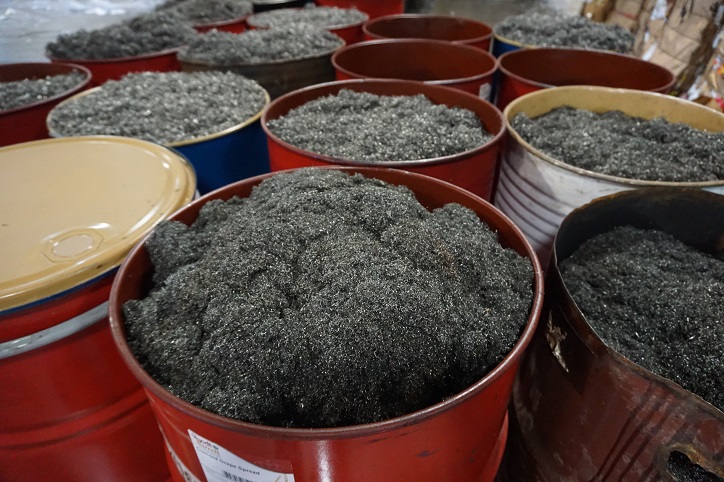Like other types of recycling, scrap metal recycling has significant environmental benefits. Repurposing existing materials reduces the need to create new ones, which in turn reduces the need to mine for metal ore and other virgin materials. Recycling also keeps it out of landfills. And since metal may be recycled over and over without diminishing in quality, there’s no reason to throw it away—which is why recyclers can pay competitive prices for scrap metal.
It’s a win-win for consumers to sell their scrap to recycling services like Miller Recycling. For the individual or business, they know they’re disposing of their scrap in an environmentally responsible way and getting paid for it. For Miller and other entities that buy scrap, we know there’s always demand for reclaimed metal.
We also know that scrap metal recycling can generate pollutants. Reclaimed scrap moves through several phases, first being collected, sorted and processed by a recycler. Ultimately it’s shredded and fed into a huge furnace to be melted down before being recast and resold.
Some parts of the process generate more pollution than others, but consumers should know that the EPA closely monitors all entities involved in scrap metal recycling. From the companies like Miller Recycling that collect and process scrap, to the foundries that mold metal into new shapes, every step of the process is regulated. That means recyclers have to adhere to environmental best practices at all times or risk serious penalties.
Scrap Metal and Environmental Regulations
Many of the EPA’s regulations directly affect scrap metal recyclers; here’s a look at three of the most significant.
The Clean Air Act is one of the most relevant EPA regulations for large commercial steel shredders and recyclers. The extreme heat created by the process of shredding heavy scrap metal, like steel and autos, vaporizes any non-metal materials and fluids (including fuel) that are mixed in with the metal, creating dangerous VOC emissions. Shredding also throws particulate matter into the air that affects air quality. Per the CAA, companies that operate these shredders are required to keep emissions below a certain threshold, which is determined by the size of the shredder and the type of material it’s used to shred. Metal shredding companies can use control systems to capture and neutralize emissions and particulates from their shredders, but they’re expensive and not every company has an adequate control system in place. Recyclers that don’t comply with CAA requirements can incur serious consequences. In 2020, a scrap metal shredder in Rhode Island agreed to a settlement that required the company to pay $2,250,000 in federal and state penalties after inspectors found that the company had built a new shredder without the proper permits and without adequate emission controls.
The Resource Conservation and Recovery Act (RCRA) is the law that governs the disposal of solid, hazardous waste. As you would expect, any business that generates solid hazardous waste must operate under a great deal of regulatory control. Materials that fall outside the EPA’s definition of solid waste aren’t governed by the RCRA, which makes things much easier for the operators that recycle these materials. Scrap metal is excluded from the definition of solid waste as long as it’s processed through “legitimate” recycling as opposed to “sham” recycling. Sham recycling essentially describes any situation where operators don’t follow best practices to produce good-quality recycled material.
The Clean Water Act established stormwater regulations that affect most entities that collect and process scrap. Scrap metal recycling facilities tend to be at least partially outdoors. Water that runs over the site and into the ground may be contaminated by chemicals and pollutants. Industrial operators like recyclers are required to have permits for industrial stormwater discharges. Many states have their own permits, but a few (including Massachusetts) require operators to secure a federal Multi-Sector General Permit. The MSGP was updated in 2021 to add new requirements for compliance, including requirements for additional monitoring and extreme weather preparation. Again, any operators that are found to be in violation with the EPA’s rules face steep penalties.
What Do Environmental Regulations Mean for Consumers?
On a surface level, the impact of environmental regulations on the scrap metal recycling industry can be invisible to the businesses and individuals that use recycling services. But that impact may be reflected in a scrap metal recycler’s prices. Staying in compliance with federal regulations can be expensive, and those costs have to be at least partially passed on to customers.
As for the actual environmental impact of recycling scrap metal:
Anyone who has questions or concerns about how their scrap will be recycled, and how the process may contribute to air and water pollution in their community, should feel free to ask questions of their scrap metal recycler. A recycler that follows environmental best practices should be more than willing to talk about its history of EPA compliance and answer questions about the protections in place at its facility.
One benefit of Miller Recycling’s long term membership with ISRI is access to comprehensive guidance about environmental compliance for scrap metal recyclers. We’re conscientious about protecting the air and water quality in our community, without sacrificing quality of service for our customers. If you have questions about anything, from how to get the best price for your metal to how we stay in compliance with environmental regulations, I’m always here to help. Contact me today!


